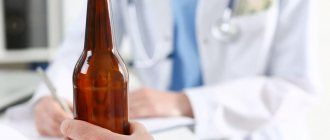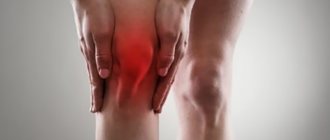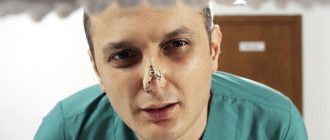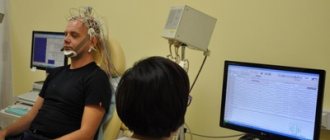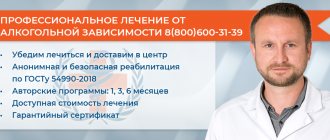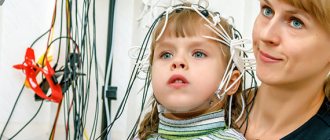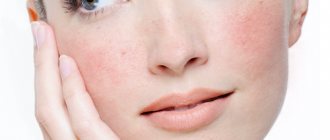Alcohol abuse has an extremely detrimental effect on both the physical and psychological state, provoking many psychosomatic and behavioral disorders. One of the most common disorders caused by alcoholism is psychosis, including alcoholic epilepsy.
- Read in the article:
- What is alcoholic epilepsy?
- Symptoms of seizures in alcoholism
- Causes of epileptic seizure from alcohol
- How to avoid an epileptic attack from alcohol?
- Types of alcoholic epilepsy
- Beer epilepsy
- Acquired epilepsy from alcohol
- Hangover epilepsy
- Consequences of alcoholic epilepsy
- Foaming at the mouth
- Seizures in alcoholism
- Blindness
- Drunk fainting
- How long does an alcohol attack last?
- First aid for alcoholic epilepsy
- Treatment of alcoholic epilepsy at home and in the AlkoZdrav clinic
Treatment prices:
| Sign up for a free and anonymous consultation with a narcologist | 0 ₽ |
| Initial consultation with a narcologist | for free |
| Consultation with a psychologist in person or Skype | 3 000 ₽ |
| Psychiatrist consultation | 5 000 ₽ |
| Psychodiagnostics / pathological diagnostics | 7 500 ₽ |
| Narcopsychotherapy | 50 000 ₽ |
| Consultation with a psychologist and selection of a treatment and rehabilitation program for an addict | for free |
| Intervention session | 12 000 ₽ |
| Social rehabilitation of alcohol addicts | for free |
| Outpatient rehabilitation in Moscow | 33 000 ₽ |
| Standard rehabilitation program | 40 000 ₽ |
| Intensive rehabilitation program | 80 000 ₽ |
| Premium rehabilitation program | 120 000 ₽ |
| Medical and social rehabilitation (21 days) | 150 000 ₽ |
| Rehabilitation Spain, Bulgaria | 200 000 ₽ |
| VIP rehabilitation program | 350 000 ₽ |
| Online addiction rehabilitation course | 28 000 ₽ |
| Rehabilitation of age-related alcohol addicts | 50 000 ₽ |
| Rehabilitation of drug addicts | 60 000 ₽ |
| Adolescent social-psychological-pedagogical rehabilitation | 70 000 ₽ |
| Psychotherapy | 5 000 ₽ |
| Family psychotherapy | 6 000 ₽ |
| Support groups for loved ones of addicts | for free |
| Webinars for relatives of addicts | for free |
| School for codependents | 3 000 ₽ |
| Transfer support | negotiable |
| Motivation for treatment | 6 000 ₽ |
| Escort to the clinic | 6 000 ₽ |
| Testing (urine/blood/hair) | specify |
Expand
Still have questions? Call us!
8
Free consultation and appointment
What is alcoholic epilepsy?
Alcoholic epilepsy includes a number of physiological conditions in which the patient experiences convulsions, seizures, automatic actions or disturbances of consciousness. This disorder is classified as a psychotic disorder that occurs mainly at the third stage of addiction development.
The disorder most often manifests itself in men aged 25 to 50 years who have suffered from alcoholism for 5-10 years. But sometimes epilepsy occurs after 2-3 years of regular alcohol consumption, this is especially true for young people and adolescents whose psyche has not yet fully developed.
Symptoms of seizures in alcoholism
Long-term drinking bouts and regular intoxication of the body with ethanol products lead to disruptions in the functioning of all organs. Epilepsy is cumulative in nature - its symptoms are invisible in the first stages of the disease. The disease is most dangerous when consuming alcohol substitutes, since in this case, in addition to alcohol poisoning, other toxic substances also affect the body.
An epileptic seizure can occur both in a state of severe alcoholic intoxication and in a state of hangover, on the 1-2 day of alcohol withdrawal. The symptoms of the disease are quite varied and largely depend on the lesions.
In general, symptoms of epilepsy can be as follows:
- Blue skin;
- Loss of orientation in time and space;
- Cognitive impairment;
- The appearance of acute or pressing muscle pain and headaches;
- There is a growing feeling of anxiety, irritability, outbreaks of aggression and hysteria are possible;
- The person may utter meaningless phrases.
Unlike other types of epilepsy, before the onset of an alcoholic seizure, a person develops obvious disturbances in consciousness and thinking. His mood changes sharply, excessive activity appears, and auditory hallucinations are possible.
Causes of epileptic seizure from alcohol
The development of alcohol dependence leads to irreversible changes in the nervous system and cerebral cortex. As a result of pronounced changes in brain function and metabolism, alcoholic epilepsy develops. It manifests itself in convulsive and non-convulsive forms.
The occurrence of epileptic conditions themselves is most often associated with:
- Lack of magnesium, potassium, B vitamins;
- Metabolic disorders associated with the influence of alcohol on the body;
- 2-3 days after a long binge, a large amount of glutamate accumulates in the body, provoking an attack of epilepsy;
- An excess of gamma-aminobutyric acids, which overexcite neurons and provoke convulsive reactions;
- Damage to natural “barriers” that protect the brain from the effects of alcohol toxins;
- Problems with the liver and pancreas.
The main factor provoking the occurrence of an epileptic seizure is blood thickening during the onset of withdrawal syndrome. This greatly slows down blood flow and disrupts the nutrition of nerve tissue, resulting in oxygen starvation, which causes a withdrawal attack.
Symptoms
The symptoms of alcoholic epilepsy are similar to classic epileptic symptoms:
✔ loss of consciousness;
✔ convulsions;
✔ pale skin, blue in the area of the nasolabial triangle;
✔ rolled pupils;
✔ foam, vomiting;
✔ uncontrolled movements.
Before an attack of alcoholic epilepsy, the following symptoms are observed. The person becomes nervous, overexcited, sleeps poorly, reacts aggressively to harmless things, and speaks incoherently.
When the attack passes, the patient appears depressed, tired and quickly falls asleep. Hallucinations and nightmares unique to this disease may occur.
Sleep disturbances, delirium, hallucinations after seizures manifest themselves more intensely, including after quitting binge drinking. The brain begins to deteriorate due to prolonged ethanol poisoning. And in the future the process continues without intoxication.
Treatment calculator
Field score:
Total score:
Patient age
Length of use
What he uses Has he previously undergone treatment Consent to treatment Concomitant diseases Employment
Waiting for values to be entered
The greatest likelihood of alcohol-induced epilepsy occurs in people with the following diseases:
- skull injuries;
- circulatory disorders;
- atherosclerosis;
- past infectious diseases;
- in the presence of neoplasms;
- with a genetic predisposition (a blood relative suffered from epilepsy).
How to avoid an epileptic attack from alcohol?
Alcoholic epilepsy develops only when there is a developed dependence on alcoholic beverages. To avoid seizures, it is necessary to carry out full treatment of alcoholism.
License and certificates:
To prevent the development of epilepsy after long-term drinking bouts, it is necessary not to try to overcome withdrawal symptoms on your own, but to go to a drug treatment clinic to detoxify the body. Using a drip, doctors will remove alcohol toxins from the body, which will help avoid an epileptic attack.
Helpful information
Find out:
- What does a breakdown after coding for alcoholism lead to?
- What will a pregnant woman’s alcoholism mean for her unborn child and is it possible to restore the health of a baby with intrauterine alcohol syndrome .
- How to identify alcohol addiction and the most common reasons why it occurs.
- What are the consequences of drug abuse, what are the dangers of drug addiction, where to get urgent drug treatment at home and in a clinic.
Types of alcoholic epilepsy
Beer epilepsy
Beer drinks and other alcoholic substitutes are very strong provocateurs of epileptic conditions, since, in addition to alcoholic toxins, they contain a large number of other substances that poison the body.
Another danger of beer is drinking the drink in large quantities. Many people consider low-alcohol drinks to be harmless, so they consider it normal to drink liters of them. As a result, acute intoxication with toxins occurs, which can provoke an attack of epilepsy.
Acquired epilepsy from alcohol
Drunken epilepsy is an acquired disease that develops against the background of pathological changes that arise due to addiction. Epilepsy most often occurs after binge drinking, with sudden withdrawal of alcoholic beverages. Frequent attacks due to severe alcohol intoxication or a hangover lead to the disease becoming chronic. Then attacks can be observed even with complete sobriety.
Hangover epilepsy
Epilepsy after heavy drinking occurs when there is a sharp decrease in the concentration of alcohol in the blood. Most often this occurs in a hangover after prolonged use, when the level of the convulsive threshold decreases.
Diagnostic features
At the moment, there are no specific diagnostic procedures and techniques that can detect the presence of epilepsy against the background of alcohol dependence. But still, if a person knows the initial symptoms, he will be able to identify the disorder at the first stage.
When identifying a disorder, you should rely on the main signs:
- Prolonged convulsions;
- A person walks or shakes violently while sleeping;
- Talking while asleep;
- If there is no previous history of the above conditions.
During the examination, the doctor must conduct a survey; it is important in making an accurate diagnosis. But still, it is not the patient himself who should be interviewed (he often does not remember anything); it is better to talk to people who were nearby at the time of the seizure.
In addition, other procedures are carried out with which the doctor can make an accurate diagnosis:
- General blood test;
- Performing magnetic resonance imaging - MRI;
- CT;
- Sometimes electroencephalographic studies may be prescribed;
- General urine examination.
Consequences of alcoholic epilepsy
After each epileptic seizure, serious disorders occur in the brain, often irreversible - nerve tissue in the cerebral cortex and subcortical structures die. As a result, rapid intellectual and personal degradation can be observed.
Alcohol episyndrome significantly aggravates changes in the personal and cognitive spheres that occur due to alcohol, characterized by:
- deviant behavior;
- irritability;
- bitterness;
- decrease in intellectual and mental activity.
Even one-time epileptic attacks with the manifestation of convulsive syndromes always occur against the background of developed alcoholic encephalopathy, which leads to irreversible pathologies of the brain.
Still have questions? Call us!
8
Free consultation and appointment
Foaming at the mouth
Foam at the mouth that appears during an epileptic seizure can cause a person to choke. It occurs due to spasm of the stomach muscles and muscle tissue.
Seizures in alcoholism
At the beginning of an epileptic attack, the patient experiences convulsions; due to muscle tension, he falls, arches, and throws his head back. At this time, breathing stops, the skin turns pale, the pupils dilate.
During seizures, the greatest danger is injury from falling or being near dangerous objects. Muscle spasms may cause temporary paralysis.
Blindness
Blindness, deafness and disruption of the speech apparatus are frequent companions of alcoholic seizures. Disruption of the normal transmission of signals from the central nervous system and severe muscle spasms lead to disruption of the functioning of the sensory organs.
Drunk fainting
Stopping breathing and convulsions during an epileptic attack often leads to loss of consciousness of the patient. This can be observed especially often in a state of severe intoxication (binge), which provokes disruption of the nervous system, which leads to the appearance of fainting.
How long does an alcohol attack last?
The active phase of an epileptic seizure is usually short, it can last from 30 seconds to several minutes. After an attack, a person may lose memory, be distracted and disoriented, and feel weak and in pain.
The frequency of epileptic attacks usually does not exceed 2-3 times a year. However, their main danger lies in the transition to a chronic form. Then seizures can occur even during long periods of sobriety, since a pathological focus of excitation will form in the brain, causing an epileptic attack.
Convulsions
Seizures may be accompanied by convulsions or occur without them. The type and severity of attacks range from slight clouding of consciousness to status epilepticus.
Seizures without convulsions occur more often. They can be recognized by motor automatisms, severe dysphoria, and clouding of consciousness.
In the case of convulsive seizures, the tonic phase predominates. Absences (short shutdowns), psychosensory (ringing, flash) and psychomotor (changes in consciousness in combination with convulsions, motor automatisms) are observed less frequently.
Some types of seizures are impossible for the average person to recognize. For example, when a patient suddenly interrupts his speech, pronounces inappropriate words or phrases, becomes anxious and irritated for no reason. This is usually taken as a sign of withdrawal.
First aid for alcoholic epilepsy
Epilepsy is a very serious disease that threatens human life, which is impossible to cope with on your own. Therefore, full treatment of the disease is carried out only in medical institutions.
Before the ambulance arrives, it is important to protect the person so that during an attack he cannot harm himself. It is necessary to lay him on the floor, put something soft under his head, and remove heavy and hard objects from his reach. To prevent the tongue from sinking, it is necessary to lay the victim on his side; a rolled up towel should be placed in the mouth to prevent strong clenching of the teeth.
Treatment of alcoholic epilepsy at home and in the AlkoZdrav clinic
If an alcoholic seizure occurs, the specialists of the AlkoZdrav clinic are ready to provide quick, qualified assistance both in our clinic and at home. Narcologists will carry out detoxification of the body to remove ethanol breakdown products and drug treatment to maintain the functioning of vital organs and systems. These measures will help restore the patient’s normal condition and reduce the risk of secondary complications after an attack.
After returning to normal health, it is important to continue treatment for alcoholism in a drug treatment clinic and rehabilitation center. Only complete abstinence from alcohol gives a favorable prognosis in the treatment of alcoholic epilepsy.
Literature:
- Alcoholic epilepsy: a manual for doctors / V. O. Generalov et al.; edited by V. O. Generalova. – 2nd ed. – Moscow: Max Press, 2015. – 43 p.
- Psychophysiological aspects of epileptic syndrome of alcoholic origin: abstract of thesis. ... Candidate of Medical Sciences: 19.00.02, 14.00.45 / Elistratova Tatyana Vladimirovna; [Place of protection: North. state honey. University]. – Arkhangelsk, 2007. – 19 p.
- Psychiatry: Textbook. for medical students universities / N.M. Zharikov, Yu.G. Tulip. – Moscow: Medicine, 2002. – 539 p.
